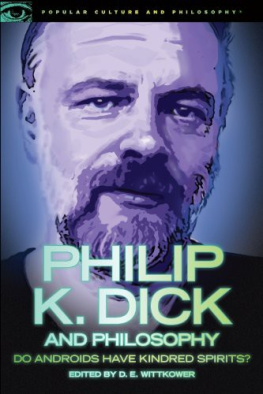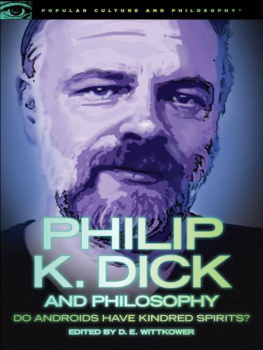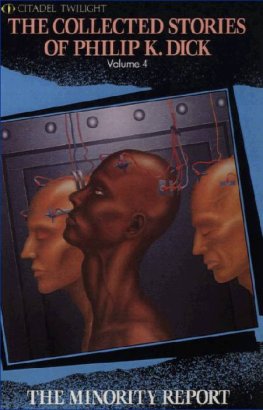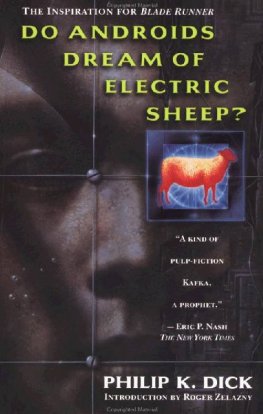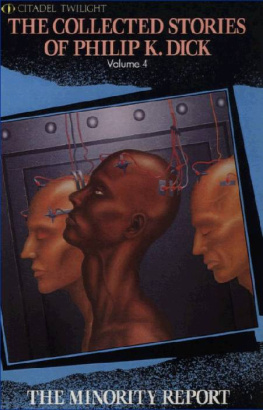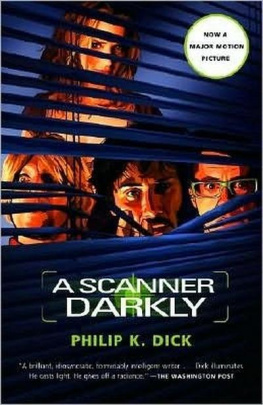D. E. Wittkower - Philip K. Dick and Philosophy: Do Androids Have Kindred Spirits?
Here you can read online D. E. Wittkower - Philip K. Dick and Philosophy: Do Androids Have Kindred Spirits? full text of the book (entire story) in english for free. Download pdf and epub, get meaning, cover and reviews about this ebook. year: 2011, publisher: Open Court, genre: Romance novel. Description of the work, (preface) as well as reviews are available. Best literature library LitArk.com created for fans of good reading and offers a wide selection of genres:
Romance novel
Science fiction
Adventure
Detective
Science
History
Home and family
Prose
Art
Politics
Computer
Non-fiction
Religion
Business
Children
Humor
Choose a favorite category and find really read worthwhile books. Enjoy immersion in the world of imagination, feel the emotions of the characters or learn something new for yourself, make an fascinating discovery.
- Book:Philip K. Dick and Philosophy: Do Androids Have Kindred Spirits?
- Author:
- Publisher:Open Court
- Genre:
- Year:2011
- Rating:4 / 5
- Favourites:Add to favourites
- Your mark:
Philip K. Dick and Philosophy: Do Androids Have Kindred Spirits?: summary, description and annotation
We offer to read an annotation, description, summary or preface (depends on what the author of the book "Philip K. Dick and Philosophy: Do Androids Have Kindred Spirits?" wrote himself). If you haven't found the necessary information about the book — write in the comments, we will try to find it.
In Philip K. Dick and Philosophy: Do Androids have Kindred Spirits?, thirty-four Dick fans and professional thinkers confront the fascinating and frightening ideas raised by Dicks mind-blowing fantasies. Is there an alien world behind the everyday reality we experience? If androids can pass as human, should they be given the same consideration as humans? Do psychotics have insights into a mystical reality? Would knowledge of the future free us or enslave us? This volume also includes two Dick short stories: Beyond Lies the Wub, and The Eyes Have It.
Philip K. Dick and Philosophy explores the ideas of Philip K. Dick in the same way that he did: with an earnest desire to understand the truth of the world, but without falsely equating earnestness with a dry seriousness. Dicks work was replete with whimsical and absurdist presentations of the greatest challenges to reason and to humanity--paradox, futility, paranoia, and failure--and even at his darkest times he was able to keep some perspective and humor, as for example in choosing to name himself Horselover Fat in VALIS at the same time as he relates his personal religious epiphanies, crises, and delusions. With the same earnest whimsy, we approach Philip K. Dick as a philosopher like ourselves--one who wrote almost entirely in thought-experiments and semi-fictional world-building, but who engaged with many of the greatest questions of philosophy throughout the Euro-American tradition.
Philip K. Dick and Philosophy has much to offer for both serious fans who have read many of his novels and stories, and for those who may have just recently learned his name and realized that his work has been the inspiration for several well-known and thought-provoking films. Most chapters start with one or more of the movies based on Dicks writing. From here, the authors delve deeper into the issues by bringing in philosophers perspectives and by bringing in Dicks written work. The book invites the reader with a casual familiarity with Dick to get to know his work, and invites the reader with little familiarity with philosophy to learn more. At the same time, we have new perspectives and challenging connections and interpretations for even the most hard-core Dick fans, even though we never speak to insiders only.
The book prominently addresses the most widely-known films: Blade Runner, Total Recall, Minority Report, A Scanner Darkly, and The Adjustment Bureau. Along with these big five films, a few chapters address his last novels, especially VALIS, which have a significant cult following of their own. There are also chapters which address short stories and novels which are currently planned for adaptation: Radio Free Albemuth (film completed, awaiting distribution), The Man in the High Castle (in development by Ridley Scott for BBC mini-series), and King of the Elves (Disney, planned for release in 2013).
D. E. Wittkower: author's other books
Who wrote Philip K. Dick and Philosophy: Do Androids Have Kindred Spirits?? Find out the surname, the name of the author of the book and a list of all author's works by series.

